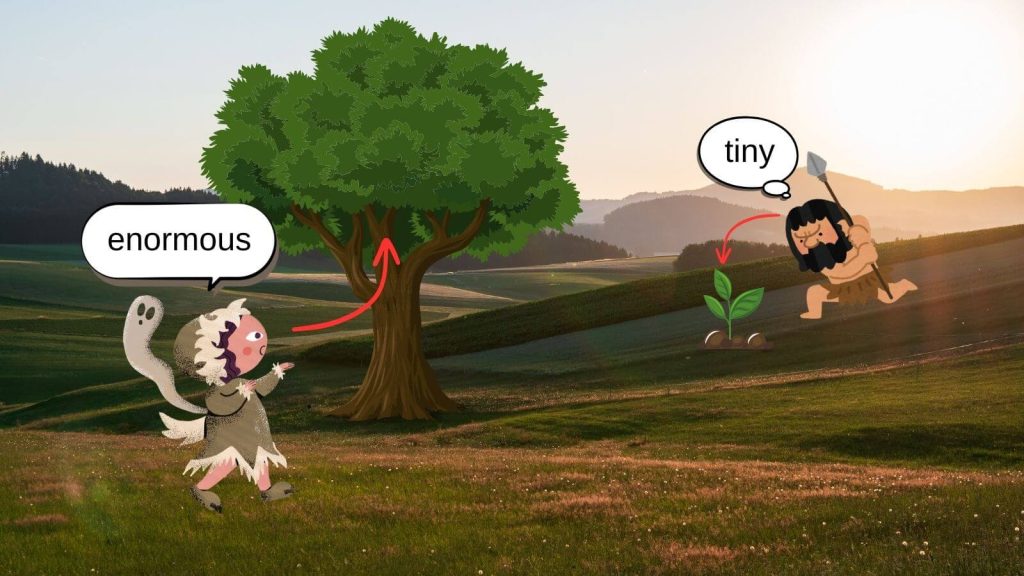Almost 100 years ago, the Kiki-Bouba experiment showed that the words we use to describe objects are not chosen randomly. There is some sense in how we name things.
Name the shapes below – which one is kiki and which one is bouba?

95% of the population thinks the left shape should be Kiki and the right one should be Bouba.
I’m showing this to highlight how psychological processes guide language itself. Let’s unpack some other processes, which are now rigorously studied in psycholinguistics.
Most natural languages will have similar phenomena and other unique linguistic properties, but let’s use English as an example here.
1. Iconinicity
Some words are said to be “iconic[1].” The brain understands their meanings without knowing the word because something in the sound or structure of the word conveys the meaning directly.
Examples
Boom: The sound of a blast
Thud: The sound of a door shutting loudly
Buzz: The sound of a bee
Context
Brobdingnagian is a huge word, and it means something huge. That means there is a strong association (correspondence and congruence) between the word’s sound, the word’s length, and the word’s meaning. However, the word “big” is not iconic at all because it is a small-sized word. Iconicity is high when the word’s sound & appearance match its meaning (Brobdingnagian), and iconicity is low when the word’s sound and appearance do not match its meaning (big).

It’s easy to understand the meaning if you point at a sapling and call it tiny and then point at an oak tree and call it Enormous, especially with hand gestures denoting size. We extract the meaning at an abstract level. And, the processing demand on the brain created by learning iconic words is very low because the form and meaning of the word naturally make sense.
Most words are symbolic (letters = symbols) and not very iconic. That means there is little to no relationship between the form and meaning of the word.
Iconic words are easier to identify, and their meanings are more easily understood than purely symbolic words (e.g. paracetamol). Some of the most well-known iconic words are onomatopoeias – words that describe sounds. Shush, hiss, kaboom, aaaaarghh are all iconic because they sound like the meaning they carry.
2. RAS Syndrome
We start making short forms of some words and then use a word from the short form after it to be specific and clear. This happens because the short form is treated as a noun, and the redundant word acts as a method to give additional meaning and make the word more recognizable.[2]
Examples
- DC Comics: Detective comics comics
- SEO optimization: Search engine optimization optimization
- RAS Syndrome: Redundant acronym syndrome syndrome
3. Semantic satiation
When a word is repeated rapidly in a short time span, like a minute, our brain stops responding to it, and we think it’s a nonsensical word or it is misspelled.
Example
You overuse a word while writing and think it is wrong when you reread it while editing.
Explanation
Lambert and Jakobovits conducted a number of experiments[3] on word repetition in the 1960s. In one study, they asked participants to repeat a word 2-3 times per second for 15 seconds. The participants rated those words on how meaningful they were. Their results? Repeated words started losing meaning. Not only that, they noticed that repeating a specific word made learning associated words harder. For example, rapidly repeating a word like “soldier” would make other related word pairs like “ship-army” harder to learn.
Their results show that words became meaningless on 2 levels: Connotation (its symbolic and structural representation) and Association (its context and related words).
- Connotative satiation: Connotative satiation is when a word starts losing its original symbolic meaning and its structure (spelling and sound) starts feeling wrong. For example, “color” stops being a word that denotes various colors, and you may think it’s misspelled.
- Associative satiation: Associative satiation occurs when a word loses its context. It becomes harder to think of other words related to the original word. For example, “color” stops getting associated with other things like texture and brightness.
4. Code-switching
Multilingual people switch between languages abruptly while speaking because some words are better represented and more accessible in a language than the previous language. If a language doesn’t match the context or expectation, switching amplifies.
Example
A person talking about a frustrating trip to a village in India might switch to their native local language to express their frustration more profoundly.
Explanation
Because language is represented in the brain as a network of neurons, bilinguals form multiple networks that sometimes overlap due to shared words, similar grammar, simultaneous learning, etc. Code-switching depends on how ‘internalized & automatic’ those languages are. While speaking, language networks of both (or more languages) are activated. As the internalization of one language grows, it becomes more accessible and more suited to the current context. Some words that are pulled out are better members of that language, and some are bridges between 2 languages. Some social cues also prime the brain to select a particular language network – office setting, childhood friends, restaurant type, etc.
5. Mondegreen effect
We mishear lyrics and think they are correct because they still make sense, kinda. This happens because the brain typically predicts the next words, and we expect that word. But the “acoustic profile” of a word can closely match many other words, and the pattern-matching done by the brain considers the pattern has matched as long as the misheard word means something to us.
Example
“Sweet dreams are made of cheese” is a misheard version of “Sweet dreams are made of these,” especially after you’ve just made a cheesy pizza.
Explanation
The mondegreen effect[4] is influenced by the brain’s expectations of words. It’s like an auto-complete prediction. But, the actual interpretation of the spoken sounds depends on our current context, too. The priming process sets off a network of ideas related to a keyword (called a prime). For example, the keyword cow can link to cheese, milk, barn, beef, etc. When primes are present, we interpret ambiguous stimuli like lyrics per the prime. So, the brain’s pattern-matching algorithm gives an “ok” signal to a word related to the prime if it makes some sense. If it doesn’t make sense, we try to force-fit a word that makes sense.
6. Semantic drifts
Words evolve to mean different things[5]. This usually happens gradually because of the words’ associations, and also dramatically when new words become better metaphors to describe something and old words change their relevance and function. Since language spreads socially between people, we quickly adopt new usages and drop old ones.
Examples
- Slay: Originally meant killing a dragon, now means “doing amazingly well.”
- Lit: Being illuminated morphed into a metaphor for being “exciting” and “very cool.”
- Awful: Full of awe transformed to mean bad
More context
Researchers have identified 2 main types of drifts based on one fundamental property of language: words refer to underlying concepts and refine the concept itself.
What has 4 legs and 1 back? It can refer to either an animal or a chair. But other words pointing to the concept of animals, like barking and tail wagging, refine the concept of a dog and distinguish it from a chair and also other animals like a cat or a racoon. When this happens, words like tail-wagging and barking gain more importance because they do the job of differentiating concepts better.

- Semantic drift: Semantic drift is a change in words we use to describe something.
- The word cute used to mean clever over 200 years ago, but now it means sweet and attractive, especially if something is small.
- Concept drift: Concept drift is a change in the context and associations of a concept over time. This usually changes the concept in some way, and sometimes new concepts emerge to replace a concept.
- Democratic, at its core, means people can vote and influence decisions for the whole population. But its associations of nationalism, fair labor laws, taxation brackets, etc., have changed over time. Due to these changes in associations, other political concepts are used, such as liberal, libertarian, orthodox, etc., to be more specific.
7. Genericized trademarks
Examples of an idea become so popular that the example (usually a branded word) becomes a concept. More specifically, an example becomes a replacement for any word that describes the underlying concept because it is more accessible and easily understood by people.
Examples
- Xerox is a company that provides photocopying services, but its popularity makes people say, “I need a Xerox” instead of “I need a photocopy.”
- Google is a company that provides internet search, and people use “google it” as a verb to mean “do an internet search.”
These are considered universal words. Iconic words are also universal. But there are at least 4 more categories 🙂
8. Emotive conjunctions
Some words are used as a “setup” to make someone bias their emotions. This is usually done when 2 people show the same behavior but the words make it sound good for one person but bad for another.
Example
Suppose 2 people are spending a lot of money on expensive things. Person A could say, “I’m classy, but you are a show-off,” to person B. This makes person A look good, but person B looks bad. (this is similar to framing in marketing psychology)
9. Cognitive trade-off hypothesis
Researchers observed that apes have better short-term memory than us, but humans are far superior when it comes to symbolic thinking like visualizing, math, coding, art, music, etc. Around 10-6 million years ago, chimpanzees and humans branched off from their common ancestor. Both species had different behaviors, needs, and environmental circumstances. Human evolution traded off that working memory for language, symbolic thinking, and metaphors, while chimps kept their glorious short-term memory.
Explanation
Chimpanzees might not yet make an iPhone or shitpost on the internet, but humans forget passwords and login codes. You lose some, you win some. The core idea is simple – there is limited space in the brain, so to develop a new function, some other function has to be sacrificed. This is the cognitive trade-off hypothesis[6] – we lost some basic cognitive abilities like (almost photographic) memory in favor of higher-order processes like abstract thinking, advanced social dynamics, sarcasm, personal narratives, and music.
10. Hypo-cognition
Lacking words to describe something can very bad at describing an idea to someone. The lack of words can also make us comprehend the idea less efficiently than someone with the words.
Example
Lacking words like network, transmit, upload, etc., can make it difficult to describe how the internet works.
More context
In 6 studies on over 2000 people across American, British, and Chinese populations[7], researchers saw that hypocognition led to lower recognition and recall of concepts (fruits, letters, etc.) for which the participants did not have a good vocabulary. The researchers also did a study where participants learned the words to be less hypo-cognitive but were not exposed to the concept.
For example, the word for different types of bread is taught, but the participants did not fully learn the concept because the researchers did not show participants the subtle differences between different types. In the study, participants who learned the vocabulary but did not learn the concept were bad at recognizing the concept. The conclusion of this study and other similar ones is that lacking the vocabulary (and the concept) makes things harder to recognize, learn, memorize, and explain.
Fascinating right?
Notice which of these concepts you see in your daily life! You’ll be surprised how frequently you’ll see them!
Sources
[2]: https://journals.iium.edu.my/asiatic/index.php/ajell/article/view/3001
[3]: https://psycnet.apa.org/doiLanding?doi=10.1037%2Fh0041531
[4]: https://journals.plos.org/plosone/article?id=10.1371/journal.pone.0084667
[5]: https://www.semanticscholar.org/paper/On-the-Semantics-of-Concept-Drift%3A-Towards-Formal-Fokkens-Braake/2ab391204c1e5397a6c50c71112c0520e29d6750
[6]: https://www.sciencedirect.com/science/article/abs/pii/S0959438809000269
[7]: https://www.researchgate.net/publication/336628798_Hypocognitive_Mind_How_Lack_of_Conceptual_Knowledge_Confines_What_People_See_and_Remember

Hey! Thank you for reading; hope you enjoyed the article. I run Cognition Today to capture some of the most fascinating mechanisms that guide our lives. My content here is referenced and featured in NY Times, Forbes, CNET, and Entrepreneur, and many other books & research papers.
I’m am a psychology SME consultant in EdTech with a focus on AI cognition and Behavioral Engineering. I’m affiliated to myelin, an EdTech company in India as well.
I’ve studied at NIMHANS Bangalore (positive psychology), Savitribai Phule Pune University (clinical psychology), Fergusson College (BA psych), and affiliated with IIM Ahmedabad (marketing psychology). I’m currently studying Korean at Seoul National University.
I’m based in Pune, India but living in Seoul, S. Korea. Love Sci-fi, horror media; Love rock, metal, synthwave, and K-pop music; can’t whistle; can play 2 guitars at a time.



























